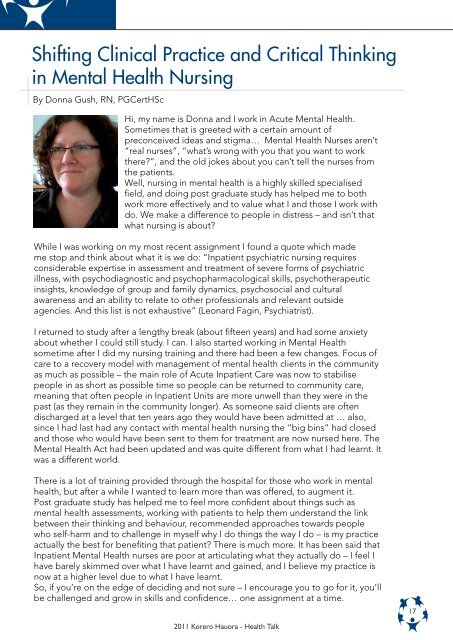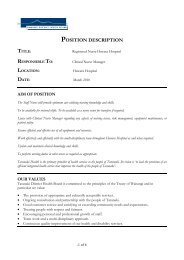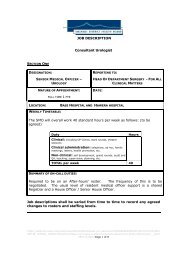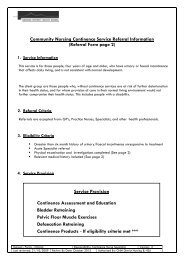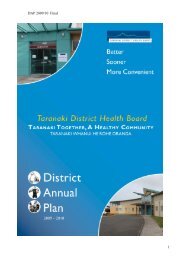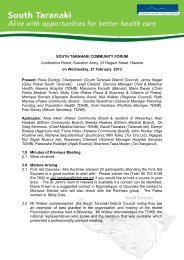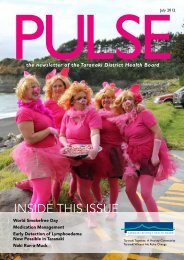Korero Hauora Health Talk - Taranaki District Health Board
Korero Hauora Health Talk - Taranaki District Health Board
Korero Hauora Health Talk - Taranaki District Health Board
Create successful ePaper yourself
Turn your PDF publications into a flip-book with our unique Google optimized e-Paper software.
Shifting Clinical Practice and Critical Thinkingin Mental <strong>Health</strong> NursingBy Donna Gush, RN, PGCertHScHi, my name is Donna and I work in Acute Mental <strong>Health</strong>.Sometimes that is greeted with a certain amount ofpreconceived ideas and stigma… Mental <strong>Health</strong> Nurses aren’t“real nurses”, “what’s wrong with you that you want to workthere?”, and the old jokes about you can’t tell the nurses fromthe patients.Well, nursing in mental health is a highly skilled specialisedfield, and doing post graduate study has helped me to bothwork more effectively and to value what I and those I work withdo. We make a difference to people in distress – and isn’t thatwhat nursing is about?While I was working on my most recent assignment I found a quote which mademe stop and think about what it is we do: “Inpatient psychiatric nursing requiresconsiderable expertise in assessment and treatment of severe forms of psychiatricillness, with psychodiagnostic and psychopharmacological skills, psychotherapeuticinsights, knowledge of group and family dynamics, psychosocial and culturalawareness and an ability to relate to other professionals and relevant outsideagencies. And this list is not exhaustive” (Leonard Fagin, Psychiatrist).I returned to study after a lengthy break (about fifteen years) and had some anxietyabout whether I could still study. I can. I also started working in Mental <strong>Health</strong>sometime after I did my nursing training and there had been a few changes. Focus ofcare to a recovery model with management of mental health clients in the communityas much as possible – the main role of Acute Inpatient Care was now to stabilisepeople in as short as possible time so people can be returned to community care,meaning that often people in Inpatient Units are more unwell than they were in thepast (as they remain in the community longer). As someone said clients are oftendischarged at a level that ten years ago they would have been admitted at … also,since I had last had any contact with mental health nursing the “big bins” had closedand those who would have been sent to them for treatment are now nursed here. TheMental <strong>Health</strong> Act had been updated and was quite different from what I had learnt. Itwas a different world.There is a lot of training provided through the hospital for those who work in mentalhealth, but after a while I wanted to learn more than was offered, to augment it.Post graduate study has helped me to feel more confident about things such asmental health assessments, working with patients to help them understand the linkbetween their thinking and behaviour, recommended approaches towards peoplewho self-harm and to challenge in myself why I do things the way I do – is my practiceactually the best for benefiting that patient? There is much more. It has been said thatInpatient Mental <strong>Health</strong> nurses are poor at articulating what they actually do – I feel Ihave barely skimmed over what I have learnt and gained, and I believe my practice isnow at a higher level due to what I have learnt.So, if you’re on the edge of deciding and not sure – I encourage you to go for it, you’llbe challenged and grow in skills and confidence… one assignment at a time.172011 <strong>Korero</strong> <strong>Hauora</strong> - <strong>Health</strong> <strong>Talk</strong>


